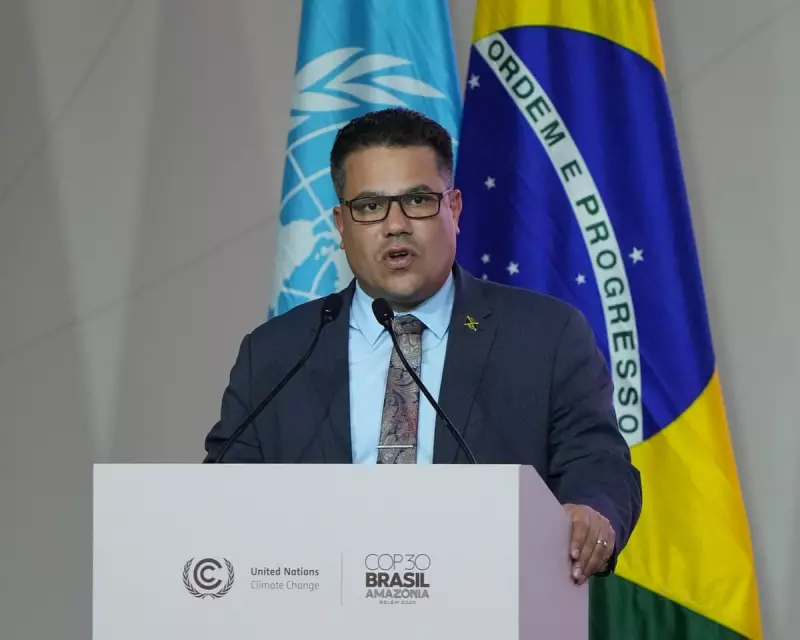
'This is Survival': Jamaica's Urgent Climate Warning
Jamaica has spearheaded impassioned appeals from climate-vulnerable nations during the critical second week of the COP30 summit in Belém, Brazil, delivering a stark message about the immediate need for action against climate breakdown.
As high-level ministers assumed control of negotiations, representatives from nations most threatened by global heating lined up to emphasise that wealthier countries must accelerate emissions cuts to prevent catastrophic consequences. They simultaneously renewed longstanding demands for financial assistance from developed nations to help manage escalating climate impacts.
The Human Cost of Climate Breakdown
Matthew Samuda, Jamaica's economic growth minister, provided dramatic testimony about Hurricane Melissa's devastating impact, describing how the category 5 storm "changed the life of every Jamaican in less than 24 hours." The hurricane, which struck just three weeks ago, caused nearly $10bn (£7.6bn) in damage and displaced hundreds of thousands of people, which Samuda characterised as evidence of "the new phase of climate change."
"We did not create this crisis, but we refuse to stand as victims," Samuda declared. "We call on the global community, especially major emitters, to honour their commitments and safeguard the 1.5C threshold for Jamaica. This is survival. It's about our people and their right to a safe and prosperous future."
Armando Rodríguez Batista, Cuba's environment and science minister, reported that his country had also been severely flooded by Melissa, warning starkly that "tomorrow it will be too late to do what we had to do a long time ago."
Global Echoes of a Climate Emergency
The sentiment was echoed across vulnerable nations, with representatives framing emissions reduction as both a practical necessity and "a moral duty" amid their daily experience of climate-related damage.
"Our very existence is at stake," stated Mauritius's foreign affairs minister, Dhananjay Ramful. "A decade after the promises of the Paris agreement, despite our good intentions, we realised that we have not done enough... our planet demands action now."
UN climate chief Simon Stiell reinforced these concerns, observing that "the pace of change in the real economy has not been matched by the pace of progress in these negotiating rooms." He noted that as climate disasters impact millions of lives and economies worldwide, driving up prices for essentials like food, "we all know what's at stake."
Brazil's vice-president, Geraldo Alckmin, emphasised the urgency, stating, "The time for promises is over. Each additional fraction of a degree of global warming represents lives at risk, greater inequality and greater losses for those who contributed least to the problem."
Negotiations Reach Critical Phase
Monday marked the beginning of the summit's "high-level segment," where ministers arrived in Belém with the expectation that they could break negotiating deadlocks that technical officials had been unable to resolve during the first week.
Liliam Chagas, Brazil's chief negotiator, summarised the transition: "We have done the technical work, now the political work begins."
While some less contentious matters have seen agreement—including agricultural measures and procedural aspects of the "loss and damage" fund for climate-stricken nations—several crucial issues remain unresolved. These include carbon market mechanisms, gender discussions, just transition frameworks, and adaptation strategies, with some suggesting the latter might be postponed until next year or beyond.
The most contentious topics, dubbed "the big four," encompass finance, trade, transparency, and addressing the inadequacy of current national climate plans (NDCs), which collectively would result in 2.5C of global heating rather than the Paris Agreement's 1.5C target.
On Sunday, Brazilian COP president André Corrêa do Lago circulated a note outlining the negotiation status and potential pathways forward, including a roadmap for improving NDCs. A significant development awaits Tuesday's planned "mutirão"—a Brazilian term for consensus-building meetings where all participants contribute to decision-making.
Meanwhile, logistical challenges persist within the conference venue itself, with reports of delegates struggling in excessively hot meeting rooms—some even "collapsing"—while other areas remain uncomfortably cold, highlighting the practical difficulties of hosting such a critical global gathering.





